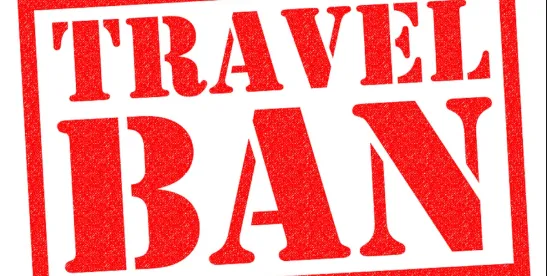Why These Documents Matter for Employers
Until recently, U.S. employers faced some uncertainty about how the June 4, 2025, Presidential Proclamation restricting entry from 19 countries would be implemented. While the proclamation itself outlined broad restrictions and limited exceptions, it provided little detail about the practical processes, approval standards, or internal government priorities that would govern day-to-day visa adjudications. In late August 2025, Department of State (DOS) guidance cables were released providing employers with valuable insight into how these restrictions operate in practice. (See DOS Cables, “Demarche Points: Presidential Proclamation On Restricting,” June 8, 2025, AILA Doc. No. 25090200 (posted Sept. 2, 2025)). The cables provide specific procedural requirements for National Interest Exceptions (NIE), including exact approval authorities and workflow processes that were previously unknown. The guidance provides examples of what types of travel will and will not qualify for exceptions, along with DOS priorities and the “America First” framework guiding decisions. DOS also detailed processing instructions including refusal codes, annotation requirements, and documentation standards, while clarifying proclamation language through operational guidance. For employers, this guidance may eliminate guesswork about whether specific business needs qualify for exceptions and provides insight into the government’s interpretation of the proclamation’s terms.
Countries Affected
On June 4, 2025, President Donald Trump issued Presidential Proclamation 10949, which suspends the entry of nationals from 19 countries under Section 212(f) of the Immigration and Nationality Act (INA). The restrictions, which took effect on June 9, 2025, impose a full suspension of entry for nationals of 12 countries (Afghanistan, Burma, Chad, Republic of the Congo, Equatorial Guinea, Eritrea, Haiti, Iran, Libya, Somalia, Sudan, and Yemen) and a partial suspension for nationals of seven additional countries (Burundi, Cuba, Laos, Sierra Leone, Togo, Turkmenistan, and Venezuela). For the partial-suspension countries, visa categories widely used by employers, such as B-1/B-2 business visitors and F, M, and J student and exchange visitor visas, are blocked unless an exception applies. DOS confirms that the suspension applies only to foreign nationals who are outside the United States and do not hold a valid visa on the effective date. Importantly, no visas issued before June 9, 2025, were revoked because of the proclamation, providing some protection for employees currently holding valid documentation.
National Interest Exceptions (NIEs): Internal Guidance Reveals Limited Scope
DOS guidance provides details about NIE processing that was previously unknown. Specifically, DOS instructs consular officers that NIEs should be “used rarely” and the “relationship of travel to U.S. national interests should be exceptional in nature.” The guidance emphasizes a “significantly higher standard” than previous travel restrictions and directs officers to consider applications “from an America First perspective.” Most significantly for employers, the guidance states that “routine purposes of travel including visiting family members in the United States, routine business travel, employment, or study in the United States will typically not be considered to be advancing a U.S. national interest.”
The NIE Review Process
DOS also details the complete NIE workflow, which involves multiple layers of review and approval. An applicant must first qualify for the underlying visa and complete all standard processing before being refused under Section 212(f) using a specific refusal code. The interviewing consular officer must then prepare a detailed action memorandum that the chief of mission (COM) must personally approve and forward to Washington, D.C. Final approval requires sign-off from the assistant secretary for consular affairs or senior bureau official. If approved, the visa must be annotated with specific language: “NIE to PP on [date] Travel.” The guidance notes that, by requesting an NIE, “the COM is personally attesting that the visa applicant’s identity is not in question, and that the applicant does not represent a threat to U.S. national security or public safety.” This personal attestation requirement demonstrates the high level of scrutiny and oversight applied to NIE decisions.
Qualifying and Disqualifying Factors for NIEs
DOS provides specific examples that potentially qualify for NIE approval, including travel for or on behalf of the U.S. government, including training for U.S. government employees, and travel at the request of a U.S. government department for legitimate law enforcement, foreign policy, or national security purposes. International sports competitions at the professional level may qualify, as may business with international organizations designated under the International Organizations Immunities Act. Critical missions or Department priorities endorsed by a COM and urgent, nonroutine humanitarian medical treatment not possible outside the United States round out the categories that might receive approval.
The guidance, however, is explicit about what will definitively not qualify. DOS states that applicants traveling for education, work, or training in the United States, including continuing students or resuming employment, will not receive NIE approval. Travel that would cause financial hardship, personal hardship including emotional distress, educational hardship, or noncritical harm to an applicant’s health and well-being is also excluded. The guidance specifically notes that applicants traveling to help or aid U.S. citizen family members or for routine commercial or business purposes will not qualify. Finally, DOS clarifies that qualifying for a Priority Appointment Request “does NOT in and of itself indicate the applicant meets the bar for national interest necessary for an NIE,” eliminating another potential pathway that employers might have considered.
Other Exceptions: Protected Categories and Special Circumstances
DOS confirms several categories that do not require NIE approval, including lawful permanent residents of the United States, dual nationals traveling on passports from non-designated countries, and holders of various diplomatic visa classifications such as A-1, A-2, C-2, C-3, G-1, G-2, G-3, G-4, and NATO categories. DOS also provides details on the sports exception, clarifying that it applies only to athletes, coaches, persons performing a necessary support role, and immediate relatives. The guidance explicitly states that accredited media and commercial partners do not benefit from this exception, despite their involvement in major sporting events.
Iranian Religious and Ethnic Minorities
For Iranian nationals specifically, the cables identify particular groups who qualify for the Iranian minority exception. These include Ahwazi Arabs, Azerbaijani Turks, Baha’i, Balouch, Christians, Jews, Kurds, Sabean-Mandaeans, Sufi Muslims, Sunni Muslims, Yarsans, and Zoroastrians. The guidance notes that ‘it is not necessary that an applicant have experienced individualized persecution,’ broadening the potential applicability of this exception beyond those with direct persecution experience.
Potential Implications for U.S. Employers
DOS makes clear that virtually all employment-related travel is excluded from NIE consideration. This includes not just new hires, but “continuing students or resuming employment,” meaning existing employees or students may not qualify based on their employment or educational status. This represents a shift from previous travel restrictions that frequently permitted business-critical personnel through exception processes. The guidance’s explicit exclusion of “routine commercial or business purposes” eliminates some business travel justifications that employers previously relied on. The exceptions for U.S. government business or international organizations will apply to few private-sector needs, leaving some employers without viable pathways for business-critical travel from the affected countries. Employees from affected countries who hold valid visas issued before June 9, 2025, may continue to travel, but the guidance makes clear that obtaining replacement visas may be difficult.
What the Cables Tell Us
DOS’ guidance provides employers with clarity about government priorities and processes in this area. While the NIE pathway requires meeting specific criteria and involves thorough review procedures, understanding these requirements enables employers to make informed decisions about international mobility strategies. The structured review process, with its 90-day and 180-day assessment intervals, provides a framework for potential policy adjustments as countries work to address identified security and vetting concerns. Armed with this guidance, employers may wish to develop more targeted approaches to workforce planning and international operations.



 />i
/>i

